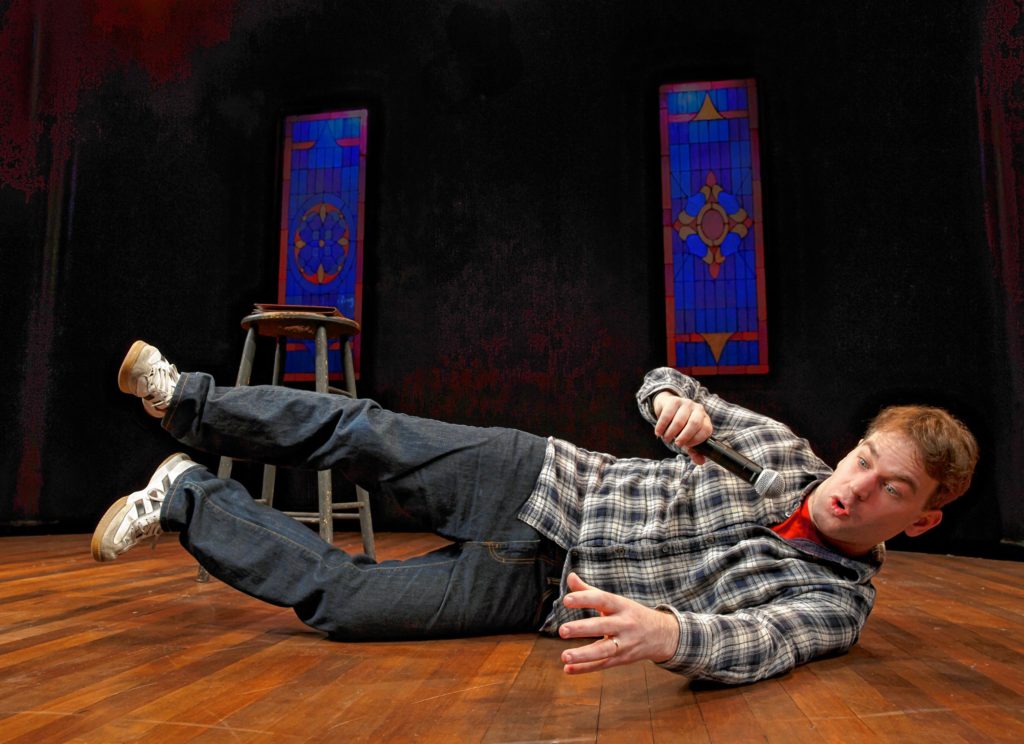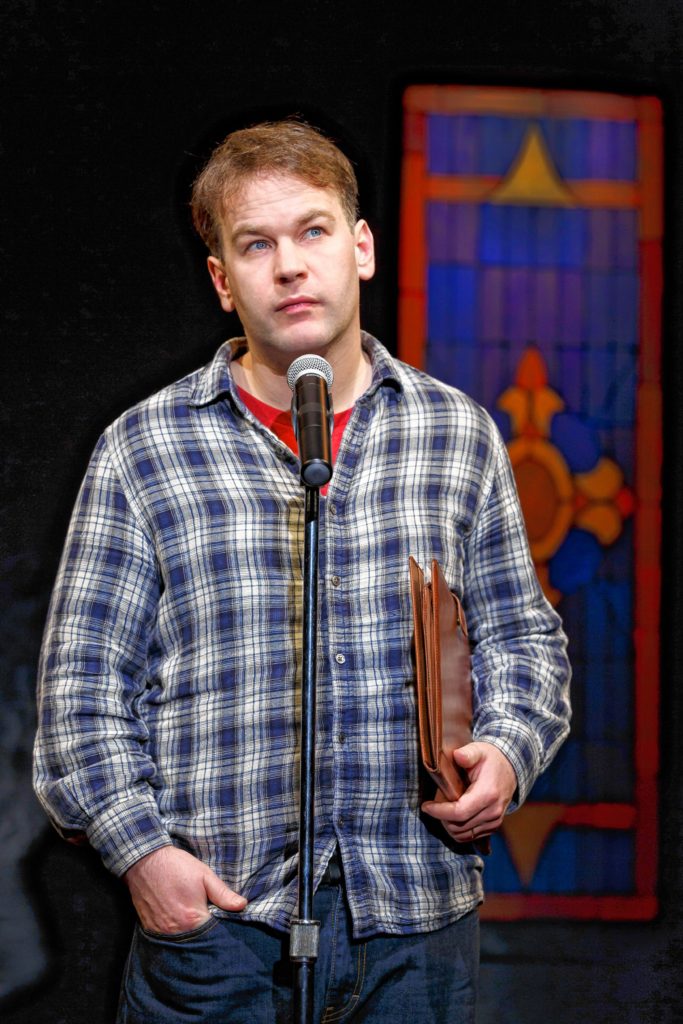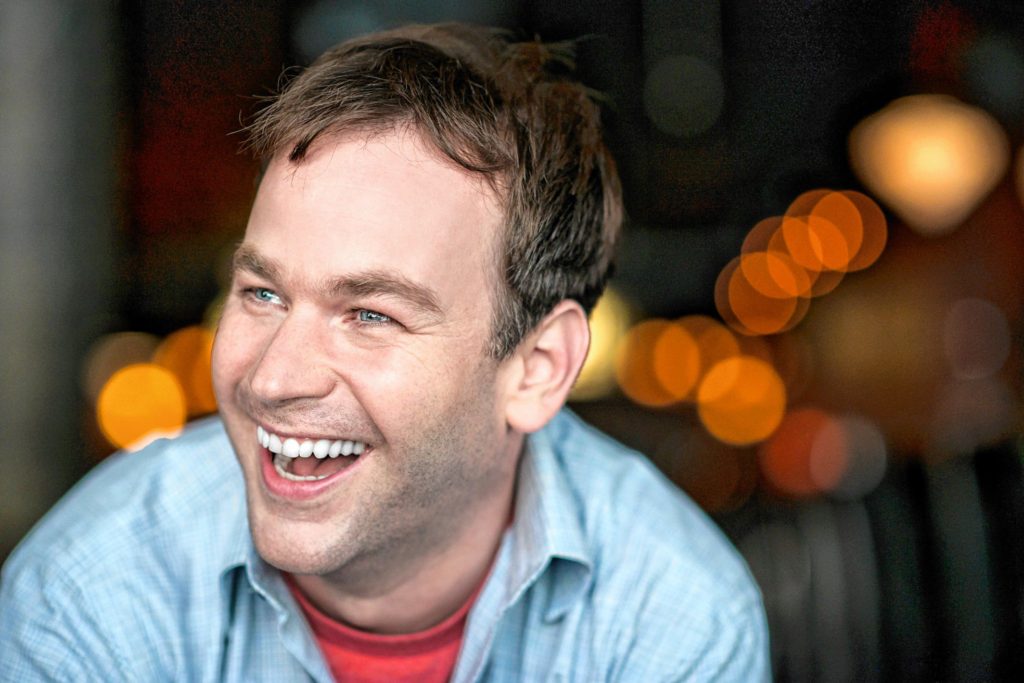Rolling with the Punchlines
A football team needs a good offensive line. So, too, does the lone, lowly comedian. That’s what Mike Birbiglia has been seeking, and perhaps has nailed down — depending on whom you ask, and how touchy they are. The mission of his new show Thank God For Jokes is to probe our knack for flipping from snarky to sore and back again — a journey through “the minefield that is modern-day joke telling.”
If you saw or met Birbiglia five years ago, the last word you’d use to describe him is risqué. But he’s been evolving quickly. Still one of comedy’s most affable acts, Birbiglia has spent the past decade growing his cheery, aw-shucks stand-up career into an ambitious juggling of projects: long-form theatrical monologues, stories for NPR’s This American Life, and slice-of-life films that feel like Woody Allen movies — if Woody preferred an evening of pizza to a night with girls.
His previous off-Broadway solo shows include Sleepwalk With Me (the film version of which he co-wrote with Ira Glass and co-directed with Seth Barrish in 2012) and My Girlfriend’s Boyfriend. His very funny new film Don’t Think Twice — about a struggling improv troupe in New York — is in theaters now.
He brings Thank God For Jokes to the Calvin on Saturday, and the Advocate caught up with him in advance. The following interview has been edited and condensed.
Hunter Styles: Have your previous one-man shows shaped your goals for this one?
Mike Birbiglia: Thank God For Jokes is a different show entirely. It started out as purely a stand-up comedy show. I thought: I’m just gonna do a show where it’s all jokes. Along the way, my director Seth Barrish and I realized that there is a theme here. The theme actually is “jokes” — this idea that jokes are dangerous. Jokes have the ability to alienate us from people, but also make us feel closer to people. So we were really excited by that possibility.
Hunter: Your roots are in stand-up, but your recent live shows have taken you into more traditional theater spaces. What can you do in a theater that you can’t do in a comedy club?
Mike: In comedy clubs, you lose a lot of lines to a bottle falling on the floor, or a drunk person tripping over a chair in the back. In theaters you don’t get that as much — almost never. It’s possible for something revelatory or unique to occur in the theater. In a comedy club, if something becomes serious for a moment, people can get antsy. In theaters, you don’t have that. But that said, comedy clubs can be pretty fun too. They’re certainly where I work out material early on in the process.
Hunter: What kind of mentality, or emotions, are you hoping to stir up in people?
Mike: First and foremost, I just want people to laugh and have a good time. It’s got a ton of good jokes and good stories. And if people think about their relationship with their wife or husband or girlfriend or boyfriend in a different way, that would be neat. But it’s not for me to tell people how to experience it.
Hunter: You’ve played hundreds of venues. Based on your interests right now, what seems too big to play?
Mike: It’s funny, because the Calvin in Northampton is one of my favorite venues that I’ve played. It’s about a thousand seats, which is the perfect size for a show like mine. It feels big enough that there’s a sense of community and small enough that it feels intimate with the performer. When it gets to three, four, five thousand seats, it’s just a whole different ball of wax.
Hunter: In your essay for The New York Times in August, called “Mike Birbiglia’s Six Tips for Making It Small in Hollywood,” you wrote that “cleverness is overrated, and heart is underrated.” What did you mean by that, exactly?
Mike: Cleverness is ubiquitous right now. It’s in commercials. It’s in sitcoms. It’s in subway posters. If you’re staying in a hotel, the welcome manual will be witty. I think wittiness becomes tiresome after a while. I appreciate when people are genuine and honest about what their human experience is. I find that very helpful, because it helps me understand how that relates to my experience.
Hunter: Are there opportunities for aspiring comedians and funny people in 2016 that you would have taken advantage of if you were in college right now, just starting out?
Mike: There are more jobs in creative fields than when I got into college [in 1996] — countless web series, commercials, branded content, more TV shows, more TV networks … In some ways there’s a lack of people doing what I did when I got out of college. There were only four comedy writing jobs in NYC: Conan, The Daily Show, SNL, and Letterman. None of those wanted me, so I went out on the road and became a stand-up comedian. In some ways I’m a little uncertain about who the next crop of comedians are. Frankly, people don’t necessarily have to do that — there are jobs for them. I just hope it’s something that stays intact, because I think stand-up comedy is a really lovely art form.
Hunter: You’ve said that comedy is about finding where the lines are, which involves trial and error, and crossing some lines whether you mean to or not. What do you say to people who aren’t stand-up fans — people don’t think that’s a worthwhile endeavor?
Mike: Sometimes there’s a cultural uproar when people feel like a comedian has crossed a certain line that we all hold dear. Oftentimes, those comedians will make jokes that make me uncomfortable. But I’d be reluctant to punish those comedians, or fire them, because ultimately we want our art to be uncensored. Everything else is censored — run through a corporate or government filter filled with legal liability and restrictions. The thing that I love about stand-up comedy is that, in some ways, it’s the final bastion of free speech. People can say anything. Sometimes what they’re saying is too far. But I think that’s okay, because it’s important to hear something that’s too far to understand what’s right on the line.
Contact Hunter Styles at hstyles@valleyadvocate.com.





